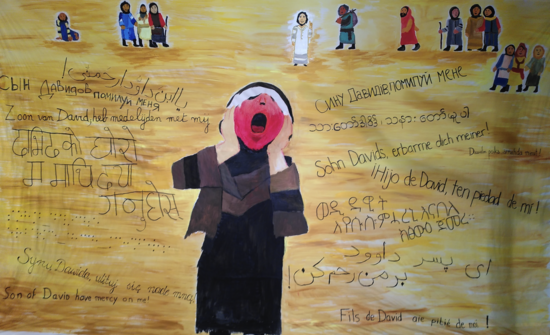Conviviality in Motion

"Bo-Kaap, Cape Town" by neiljs is licensed under CC BY 2.0
Exploring Theologies and Practices in Multiethnic Christian Congregations in Europe
Much public discussion about migration in Europe focuses on the conflicts and challenges related to increased religious diversity due to Muslim migration to Europe. This research project aims to shift this attention to the neglected topic of how Christians of different ethnic backgrounds live together in their respective religious communities, practice their faith together, and negotiate difference and conflict. This topic has not been sufficiently attended to with regard to public perception or academic research. The research project "Conviviality in Motion" explores the practices and theologies that emerge from these communities, asks if and how these communities cultivate an affective and religiously grounded sense of belonging, and investigates to which extent they develop a distinct religious expression of being church together.
The project focuses on six Christian communities in Switzerland, Italy, and Germany that consist of autochthonous members and migrants. They have been selected because of their documented histories of engendering convivial practices, negotiating ethnic diversity, and living through crises as well as triumphs. In addition, they consciously see these practices as foundational to their Christian self-understanding and consequently experiment with shared leadership models. Finally, most of them have been partially recognized by their denominations as examples of important emerging practices within congregations.
The project proceeds from a preliminary concept of "Conviviality in Motion" that will serve as a shared frame of reference for the empirical part of the study. This will consist of three multi-sited ethnographic studies of multiethnic Christian communities in Switzerland, Germany, and Italy and two cross-sectional studies. The first cross-sectional study will attend to the interaction between Christians and Muslims that appears to be a pivotal common thread to all field sites; the second cross-sectional study will compare and synthesize all findings in light of an empirically grounded theological account of Conviviality in Motion.
Switzerland: "Unconditional Conviviality? Dynamics of Exchange in Multilingual Congregations in Precarious Contexts"

Rebekka Schaetzle
The study in Switzerland works in particular on the question how in (super)diverse congregations a feeling of belonging together arises despite the very different living conditions of "migrants" and "Swiss". Following questions may be relevant: How does it affect the service if some participants have an insecure residence permit status? How are people who have been ordered to leave the country still present in the community? How do congregations approach the desire of people in pending processes for the right of asylum to find a home for a certain time? How are different possibilities of "Swiss" and "migrants" to access participation in society, privileges or economic ressources adressed? The project is based on empirical studies in two congregations which share a sensibility for migration while being structurally and confessionally divergent. Particularly, the shared approaches and the specific positions with regard to theologies and practices of conviviality will be addressed.
Italy: «Essere Chiesa Insieme»: konviviale Praktiken und Theologien der methodistisch-waldensischen Union in diachroner und synchroner Perspektive

"Italian flag #1" by Ed Yourdon is licensed under CC BY-NC-SA 2.0
Luca Ghiretti
The subproject will provide a diachronic perspective through which to study the process of an entire church union becoming a multiethnic church set against the backdrop of the shifting migration politics of a nation state over a 40- year period. The Union of Methodist and Waldensian Churches in Italy is one of the outstanding examples in Europe of how the normative goal of being church together has been articulated, put to test, revised, and newly rearticulated. The developments will be analyzed in the context of changing patterns of migration and migration
politics in Italy since the eighties. For each of the migration policy phases it will be necessary to clarify how the state presented and positioned itself over and against churches that were acting in favor of migrants and how the FCEI (Federation of Protestant Churches in Italy) as well as individual congregations responded to such challenges. This will be a crucial research perspective and will include the most recent political developments in Italy.
Deutschland: „Gelebte Utopie. Beiträge zu einer diversitätssensiblen praktisch-theologischen Ekklesiologie“

Lisa Ketges
In two congregations in Germany that form relatively stable interculturalChristian communities, the research investigated dynamics of conviviality as a heuristic concept of living together. The results imply an ecclesiology that theologically reflects super-diversity, interculturality, and the notion of community. First, a new concept of power, Gestaltungsmacht(formative power), allows to analyze power in its complex dynamics. Second, praxeologically generated practices of conviviality comprise e.g.: conflict management and communication strategies; ways of intercultural theological thinking; and practices of joint service and prayer as means of community building and boundary making. Finally, this contributes to a vision of an intercultural church as a diverse community; the characteristic of catholicity as prolific tension; and an emphasis on participation as conceptual element in intercultural Christian communities.
Cross-sectional Study: Interreligious Perspectives of Conviviality
Claudia Hoffmann
This empirical and comparative research project explores practices and forms of communication in interreligious contact zones in six so-called intercultural communities in Switzerland, Germany and Italy.
The goal of this study is to offer a thick description of such contact zones, revealing some interreligious perspectives of conviviality. The intention is to show how religious diversity is perceived and negotiated. It will also reveal convivial theologies expressed in texts, symbols, images, and rituals.
In order to learn more about these contact zones, I will access data from the individual studies on the one hand, and on the other hand, I will conduct interviews with different people who are engaged in these interreligious contact zones. The following questions will be important: How are belonging and boundaries negotiated? What role do conflicts play?
Through a comparative analysis of the different contact zones, focal points in each community will be identified, leading to generalizable conclusions.
Cross-sectional Study: Theologies and Politics
Andrea Bieler
The second cross-sectional study will synthesize the results of the entire empirical study in order to refine the concept of Conviviality in Motion by focusing on the following research questions: What are the insights that emerge from a comparative perspective on the concept of conviviality in motion? How do these results support the theological task of developing an ecclesiology that is sensitive to issues of ethnic diversity?
In addition, a second emphasis will be on the question of what extent and through what means do the operating theologies articulate issues of conviviality in more structural and political terms. How is the realm of the political conceptualized in relation to religiously grounded symbolic orders that are operating in the researched communities? How are issues of migration politics, economic disparities, or experiences of social marginalization and racism articulated and raised as a topic of theological and political reflection and action? How is conviviality being addressed in the political deliberations of the operating theologies?
These two research perspectives contribute to the overall research focus on theologies and practices of conviviality from an internal as well as an external perspective.
Project partners
Dr. Eva Baumann-Neuhaus (Swiss Institute for socio-pastoral research St. Gallen) supports the research group as expert on empirical research.
Quick Links
Social Media
